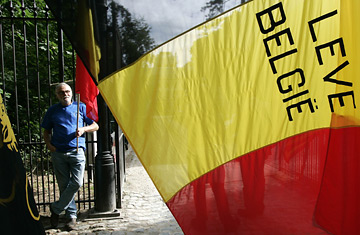
A supporter for a united Belgium stands near a Belgian flag that reads "Long live Belgium"
Composed of French and Flemish speakers who share little common culture, Belgium has always been a bit of an odd duck. Its viability as a nation has been regularly questioned since its founding in 1830, but perhaps never as much as in the last three months. Since national elections in June, the country's politicians have proved unable to form a national government, causing more and more Belgians to wonder whether the country can — or should — stay united.
In the past, politicians from both sides of Belgium's language divide have shown a legendary capacity for cobbling together seemingly impossible coalitions. But the will seems to have dried up this year as trust has shattered between Flanders in the north and Wallonia in the south.
Yves Leterme, the Flemish Christian Democrat whose party did best in the June 10 parliamentary elections, was expected to build a coalition with the francophone Christian Democrats, as well as the two liberal parties. But that planned "Orange-Blue" coalition collapsed in acrimony after Leterme insisted on a government platform that would wrest more power from the already weak central government and hand it over the increasingly powerful regions. They already control transport, housing, agriculture and education, but Leterme — playing to his base among prosperous Flemings who resent paying taxes to subsidize lagging Wallonia — sought to add taxation, social security, economic policy, immigration and nationality. The Francophones balked, Leterme stepped back from efforts to form government, and Belgian politics are in a curious state of suspension as the country struggles to find an alternative government coalition.
Belgium has faced long political deadlocks before: it endured six months of coalition negotiations and caretaker governments from October 1978 to April 1979 before a compromise was agreed. But this time, the politicians appear to have reached new levels of mutual incomprehension. "The north and south don't know each other any more," says Peter Vandermeersch, editor of the Flemish daily newspaper De Standaard. "Old-guard politicians would meet, if not publicly, then privately. They would play the parts of the staunch Fleming or Walloon, but they would strike a deal."
The crisis has stoked a media frenzy about whether divorce is in the air. Every day seems to bring a new twist on how Belgium could emulate Czechoslovakia's "velvet divorce," how the country's spoils might be divvied up, and even whether the split halves would be interested in joining with France or the Netherlands.
Not everyone is convinced that those concerns are real. "If you believe the media, this country is in a state of permanent civil war," says Dave Sinardet, a political scientist at the University of Antwerp. "This is more a crisis of government than of the country. I expect the parties to reach some sort of solution soon — as they have done in the past — and when everyone calms down, we should see all this talk about splits and independence evaporate."
Still, opinion polls appear to show Flemish faith in Belgium deteriorating. In March this year, a survey found only 11% of Flemish backed independence. But after the coalition spat and months of government paralysis, that figure had soared to 39% by August and now stands at 43%. Unless Belgium's political leaders can rekindle their faith in each other — and revive some deft coalition-building skills — the sentiment that Flanders is better off alone could become a fait accompli.
